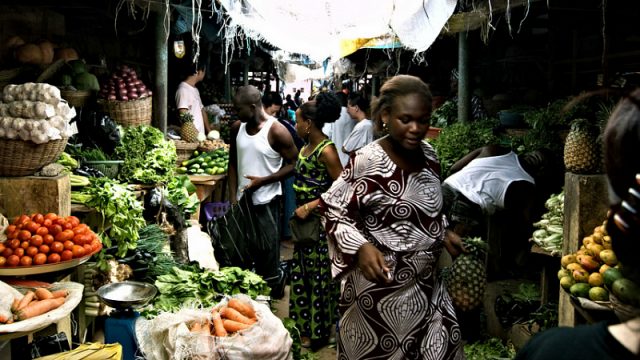Shopping in Lagos, especially for souvenirs, isn’t exactly a refined experience. The leisure tourism industry in Nigeria hasn’t really taken off yet, and because of that, the infrastructure catering to the run-of-the-mill tourist doesn’t really exist. So there isn’t a quaint old town center, nor is there a strip of great boutiques or bars and cafés. But there are a couple of street markets in Lagos, which cater to tourists to varying degrees.
The only centralized market designed with tourists in mind lies several miles east of the downtown area in Lekki. Visitors should also check out the Balogun market on Lagos Island, which specializes in the everyday goods catering to the general populace that commutes through town every day. Though there isn’t much to buy here from a touristic perspective, it’s worth a visit just to get a sense of daily life in Lagos, and it’s certainly closer to the city center.
Lekki Market
If you’re bent on leaving Africa with a wooden knickknack or tribal painting, your best bet on getting a decent deal is at Lekki Market. Built specifically to sell African goods to visitors, the market is divided into several long outdoor corridors, with maybe two hundred vendors renting out rigid shops to hawk their wares. It’s a nice way to organize what could be an enormously busy space, though in the right light it could also be confused with a self-storage facility on a cable TV reality show.

A vendor at Lekki market, Lagos. (Photo courtesy of TripAdvisor)
Goods here range from the expected variety of tribal masks to assorted carved, forged, chiseled and antique animal figurines to locally made paintings and furniture. Since overhead costs in Nigeria are generally pretty high, don’t expect to get an outrageous deal here, but expect slightly better than what you’d find in a hotel gift shop. You can also talk to the vendors at length about the heritage of each item, though don’t be surprised if they tell you the goods are from a neighboring country. I was able to pick up two bronze antelope figurines for about N6000 and an interesting bird poster made of butterfly wings for another N4000.
Things can get a bit harried at Lekki, with numerous vendors soliciting the oyibo (white folks) that comb through the aisles. The harassment isn’t too aggressive though, and most will leave you alone if you push past and keep your head down. If the crowded space bothers you though, try heading over later on Sunday morning, when half of the stalls are closed and street traffic to Lekki is much more reasonable.
You can also expect a fair amount of haggling here. While the vendors aren’t too obnoxious with their initial prices, it’s safe to take 1/2 to 1/3 off of the initial price and negotiate from there.
To get to Lekki Market you’ll need to travel about six miles east of Victoria Island on the Lekki-eke expressway. It’s a fairly quick journey if traffic is light, but it also takes you off the main expressway into some rural and poorly maintained roads. Be prepared to see a seedier side of Lagos on your way into the market. However bear in mind that many tourists make this trip, so it’s very safe.
Balogun Market
While there are major shops comparable to Wal-Mart or Tesco on the outskirts of Lagos, much of the commercial activity in the central city takes place in smaller storefronts or community markets. The largest of those is Balogun, which is centrally located on Lagos Island and is the epicenter of shopping in the city.
During my visit to the market, my driver refused to get within a four block radius and sent me in on foot – and for good reason. Pedestrian activity picks up exponentially as you get closer to the center of the market, and internal streets are teeming with Lagosians.

Balogun market (Seattle Globalist/Flickr)
Expect to see just about everything imaginable on the street, from vendors carrying baskets of peanuts on their heads, to children pushing wheel barrels full of junk, to food carts selling oranges and boiled corn, in a delightful and slightly terrifying mix of activity. Moreover, cars are technically allowed on the street, so occasionally the throng parts like the Red Sea as a lumbering minibus tears through the crowd.
Imagine anything that an average Nigerian household would need and you’ll find it at Balogun. The market is divided up by types of wares, with practically an entire neighborhood devoted to things like fabrics and used clothing. Prices are variable and negotiable, though you won’t need to haggle as aggressively as you would in Lekki. Since it’s a more “everyday” market, Balogun is more about the progress of commerce than making a buck off of tourists.
In fact you might be hard pressed to find a tourist among the streets of Balogun. As a foreigner you may find that you stand out among a sea of locals, which can make even the heartiest of adventure travelers quite self-conscious. The good news is that people here are incredibly welcoming and won’t mind you weaving around and stopping at stalls. On the other side of that equation, it’s also probably not a good idea to be swinging around a camera, taking photos and flaunting your wealth. Keep your head down and act like a local and you’ll be just fine.
Needless to say, it probably wouldn’t hurt to hire a guide prior to heading into the market. In addition to getting a better tour through the tempest of people and vendors, it will also add an extra layer of security.
To get to Balogun market head in to the center of Lagos and look for the CMS. The market is several blocks inland from the transit hub on Balogun Street. Any driver should know how to get there.
Related content on AFKTravel:
Half-Day Trips From Lagos, Nigeria
City Guide: Lagos, Nigeria
Exploring the Neighborhoods of Lagos, Nigeria

